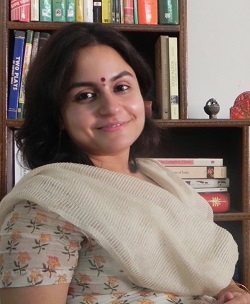
Dr. Shonaleeka Kaul is a cultural and intellectual historian of early South Asia. She is Associate Professor at the Centre for Historical Studies, Jawaharlal Nehru University. She has also been the Malathy Singh Distinguished Lecturer in South Asian Studies at Yale University, USA; the Jan Gonda Fellow in Indology at Leiden University, The Netherlands; and the DAAD Visiting Professor at the South Asia Institute, Heidelberg University, Germany.
Her books include The Making of Early Kashmir: Landscape and Identity in the Rajatarangini (Oxford University Press, 2018), Cultural History of Early South Asia: A Reader (Orient BlackSwan, 2014), Imagining the Urban: Sanskrit and the City in Early India (Permanent Black and Seagull Books, 2010), and, most recently, Eloquent Spaces: Meaning and Community in Early Indian Architecture (Routledge, 2019) and Looking Within: Life Lessons from Lal Ded, the Kashmiri Shaiva Mystic (Aleph, 2019).
She has also contributed over two dozen articles on Indian history and literature to international volumes and journals including Cambridge World History, Encyclopaedia of Historiography: Africa, America, Asia, History and Theory, Encyclopaedia of Indian Religions and Indian Historical Review.
She has been invited to speak widely around the world, especially on Kashmir, including at Sorbonne University (Paris), University of Sapienza (Rome), University of Witwatersrand (Johannesburg), Australian National University (Canberra), Stanford University (San Francisco), Association of Asian Studies in Asia (Delhi), and the United Nations (Geneva), among other international fora.
She writes regularly for Frontline, Open, and Times Now Digital on history, culture, and education.
Abstract of the lectures
The Aesthetics of Pleasure: A Social History of Kāma – I & II
Drawing on Vātsyāyana Mallanāga’s Kāmasūtra, the earliest extant Sanskrit text on erotics from the 3rd/4th century CE, and on the allied literary genre of kāvya from the 1st millennium CE, these talks explore the multiple meanings and representations of pleasure as a social construct and ethic in early India, and its implications for a history of behaviour, emotion, sexuality and urbanity.
Readings
Shonaleeka Kaul. 2009. ‘Pleasure and Culture: Reading Urban Behaviour through Kāvya Archetypes’‘ in Singh and Lahiri eds, Ancient India: New Research, pp.252-279.
Wendy Doniger and Sudhir Kakar.2002. transl., Kāmasūtra, ‘Introduction’, pp.xi-lxviii.